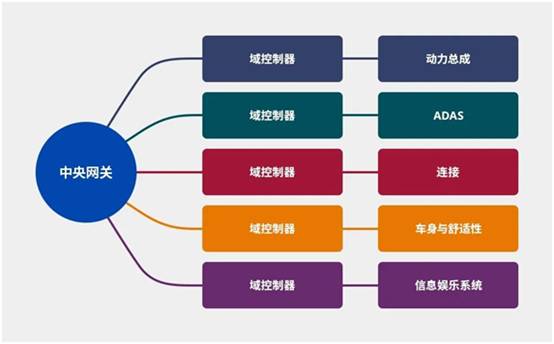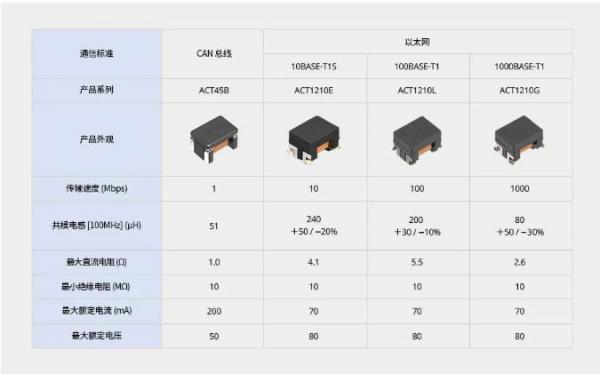The Key to Noise Suppression in Vehicle Networks
Time:2023-11-13
Views:503
Driven by the rapid development of advanced driving assistance systems (ADAS) and autonomous driving technology, modern cars are equipped with a large number of sensors, such as cameras, radar, LiDAR, etc. In car data communication in car networks are transitioning towards faster automotive Ethernet standards. As data speed increases, the importance of noise suppression in these networks has also increased.

This tweet introduces a noise filter optimized for the latest in vehicle network standards.
Development of Vehicle Network
Nowadays, cars are equipped with a series of auxiliary driving electronic devices such as cameras, sensors, and radars. The onboard network is responsible for transmitting the data sent by these devices and integrating various ECUs (electronic control units). Due to the direct impact of the performance of the vehicle network on vehicle safety, it is a key component of the automotive infrastructure. At present, in car networks are transitioning from the commonly used CAN BUS (Controller Area Network Bus) * 1 standard to faster communication speed in car Ethernet * 2. Automotive Ethernet can not only improve data transmission speed, but also help improve real-time performance and enhance security.

The car is equipped with various ECUs, such as those related to powertrain, infotainment system, and safety, which are connected to each other through a network.
The Key to Vehicle Network and Noise Suppression
With the continuous development of data transmission in vehicle networks towards higher speeds and larger capacities, noise issues have gradually become undeniable. Noise is a useless signal that interferes with data communication and may damage data, leading to sensor detection errors, transmission delays, and various electronic device failures. Especially nowadays, modern cars are filled with electronic devices, and noise induced malfunctions may seriously affect car safety, so noise suppression is more important than ever before.
As is well known, electronic devices can generate electromagnetic waves. However, if an electronic device operates without interfering with surrounding devices or being affected by external interference sources, it indicates that the electronic device has electromagnetic compatibility (EMC) * 3. Noise filters are typical components for achieving electromagnetic compatibility.
As the name suggests, noise filters can eliminate unnecessary signals (noise) in the network to ensure the quality of data communication; Additionally, it can absorb or block noise to ensure accurate data communication. By reducing transmission errors, noise filters can maximize the performance of vehicles with advanced functions.
Network standards such as CAN bus and automotive Ethernet use differential signal transmission method, which can resist external noise, but common mode noise from internal circuits can also affect transmission in both directions. Although different types of noise may penetrate communication lines, common mode filters are specifically designed to effectively eliminate common mode noise and ensure communication quality.
Choosing the appropriate noise filter for the automotive network is crucial
The noise filter must be suitable for the corresponding communication standards, frequency range, and data rate. To suppress noise in automotive Ethernet and CAN BUS, filters with different characteristics are required. Even if the decision is made to use a common mode filter, the selection range should be reduced based on the frequency requirements for suppressing common mode noise. Due to the serious impact on car safety caused by the failure of noise filters and other electronic components, it is necessary to pay close attention to the service life, durability, and reliability of noise filters.
TDK‘s common mode filter adopts proprietary design and winding technology, and its high performance is widely praised, occupying a large market share in the field of common mode filters for automotive applications. In addition, we have successfully developed products that are compatible with the 10BASE-T1S standard, leading our competitors.
In recent years, with the development of autonomous driving technology and the popularization of electric vehicles, the demand for vehicle noise control has become increasingly strong. Therefore, the importance of EMC technology in automotive design has become increasingly significant. In car networks using TDK‘s ACT series common mode filters, in addition to traditional CAN-BUS, high-speed networks such as automotive Ethernet have also been rapidly applied, which is sufficient to meet the needs of high-speed and high-capacity communication.
In addition to having powerful noise suppression functions, filters should also exhibit good balance characteristics to avoid adverse effects on communication signals. In addition, the electrification and versatility of automobiles have also expanded the application of common mode filters in power lines. TDK will continue to expand its common mode filter product series to meet this development trend. The market for automotive noise suppression components is expected to continue to expand. TDK will not only design and develop components, but also provide comprehensive EMC solutions, including evaluation services and policy recommendations, in order to contribute to the progress and development of the automotive industry.

Application of TDK Common Mode Filter in Automobile
As car networks become faster and more complex, the challenges caused by noise are more severe than ever before. Fortunately, common mode filters and other noise filters have helped overcome this challenge and supported the significant development of in vehicle networks. Choosing appropriate noise filters for the vehicle network environment (with multiple standards available) can further enhance the safety and performance of the vehicle. The technology hidden in a small noise filter is expected to provide huge support for the development of the entire automotive industry.

TDK has a rich range of noise filter products, including products that can match network standards such as CAN-FD and Flex-Ray.
Terminology Explanation
*1- CAN-BUS (CAN Bus Protocol): Full name for Controller Area Network Bus, it is the most widely used serial communication protocol in vehicle networks.
*2- Ethernet: The most commonly used wired network standard for personal computers and electronic devices. As a vehicle network standard, it is also becoming increasingly popular.
*3- EMC: Full name for Electromagnetic Compatibility, which refers to the performance of electronic devices in terms of noise. Specifically, it is divided into EMI (electromagnetic interference) and EMS (electromagnetic induction intensity). The former refers to the noise emitted by the device itself, while the latter refers to the device‘s response to external noise.
|
Disclaimer: This article is transferred from other platforms and does not represent the views and positions of this site. If there is any infringement or objection, please contact us to delete it. thank you! |











